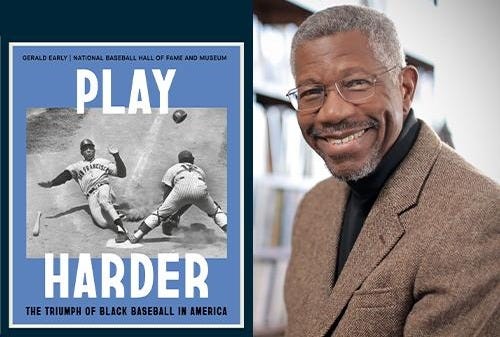I recently interviewed Professor Gerald Early of Washington University in St. Louis with my colleague Ian Rowe for our podcast, The Invisible Men. To prepare, I read his latest book, Play Harder: The Triumph of Black Baseball in America (2025), published in collaboration with the National Baseball Hall of Fame. This richly illustrated work, features contributions from distinguished baseball writers and scholars. With a foreword by Dave Winfield and a narrative spanning the post-Civil War era to today, Play Harder illuminates the resilience, ingenuity, and cultural significance of Black baseball players and team owners. At over 300 pages, it is a compelling historical chronicle and a passionate defense of this uniquely American legacy.
Early posits that baseball, entwined with American ideals of democracy, became a battleground for racial equality through Black athletes’ contributions. He traces the sport’s evolution from a recreational outlet for newly freed Black individuals post-Civil War to the Negro Leagues’ formation under leaders like Rube Foster. Archival photos and documents from the Hall of Fame vividly bring this era to life. The narrative pivots to Jackie Robinson’s 1947 integration of Major League Baseball (MLB), an event that shattered the baseball color barrier and ushered in icons like Willie Mays and Hank Aaron.
Early’s analysis is timely, given MLB’s recent recognition of the Negro Leagues and the integration of their statistics. Structured chronologically, the book builds a comprehensive tapestry of Black baseball’s journey. Early’s introduction asserts that “Black baseball was a world, a cosmos unto itself.” Key eras follow: baseball’s role as a meritocratic symbol for Black communities post-Dred Scott, with figures like Frederick Douglass encouraging his sons’ participation; the Negro Leagues’ rise, spotlighting teams like the Chicago American Giants; and Robinson’s debut, followed by Black players’ impact through the civil rights and Black Power eras. The book also examines baseball’s declining popularity among Black athletes, who increasingly turned to football and basketball.
Spotlight essays by contributors like Larry Lester and Leslie Heaphy enrich the narrative, exploring topics like the Negro Leagues’ economics and Black-Latino player intersections. These essays add depth while preserving Early’s authoritative voice. The book excels at connecting individual stories to broader historical currents. Early’s scholarly prose engages both casual readers and baseball enthusiasts. Archival imagery, such as a 1916 Chicago American Giants photograph, adds a tangible connection to the past. The book’s hard cover construction is extremely high quality.
Two reflections emerged while reading. First, I wished for more discussion of Jack Johnson, the first Black heavyweight boxing champion, who “integrated” boxing nearly four decades before Robinson. Can there really be any discussion of 20th century sports without starting with Jack Johnson? Johnson advocated for Black Americans to relocate to Mexico in the 1920s with the goal of leaving American racism behind, a sentiment echoed by some Negro League stars years after Johnson. In his autobiography, Johnson recounts escaping to Europe to avoid federal criminal charges by hiding among a baseball team, if true, a fascinating intersection.
Second, I remain truly frustrated by MLB’s failure to integrate Negro League teams, a common practice in sports league growth (e.g., AFL-NFL, ABA-NBA mergers). Instead, White teams paid bounties to acquire select Black players, sidelining Black owners, and marking the Black league for death, since its fans followed the Black players to White baseball. This approach, as Early notes, fueled frustrations among Black owners and contributed to the ongoing scarcity of Black-owned sports franchises today. Integration when it involved Black people too often required us to give up too much.
Play Harder transcends sports literature, framing baseball as a microcosm of American racial dynamics. Early, with the National Baseball Hall of Fame’s support, delivers a celebration and critique, honoring Black players’ legacy while confronting the racial injustices that shaped their journey. Whether you’re a baseball aficionado or a student of history, this book demands attention. Early was absolutely the best writer for this project, few understand America better than him. His book informs and inspires, urging us to “play harder” in our own pursuits.





